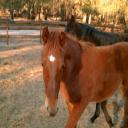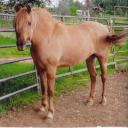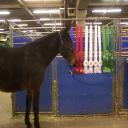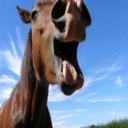Yahoo Answers is shutting down on May 4th, 2021 (Eastern Time) and beginning April 20th, 2021 (Eastern Time) the Yahoo Answers website will be in read-only mode. There will be no changes to other Yahoo properties or services, or your Yahoo account. You can find more information about the Yahoo Answers shutdown and how to download your data on this help page.
Trending News
I'd like to hear of people's experiences with natural horsemanship?
I would like to hear of readers experiences using natural horsemanship with their animals. Good or bad and any trainer's system. I am impartial at the moment but since a new horse is imminent I'm collecting info for reference.
A bit about me - I've owned horses for thirty+ years and have broken them to ride and drive. I'm just interested in this 'new' idea. My personal theory is that any good horseman uses what is now called 'natural ' techniques automatically since they know horses and know how they react - not so much the specifics but the idea behind the techniques - however I'm willing to use any tool available to me since the new horse is reportedly 'difficult' so I guess I would like to hear how it worked for you, what were the pros, the cons. Thanks in advance for any replies :)
10 Answers
- foxhunter1949Lv 71 decade agoFavorite Answer
Like you I believe that the way I break young horses is fine! I teach to longe, long rein, back and ride away.
I can see how join up helps with a nervous/suspicious horse but still prefer to go through my traditional ways rather than using it as a short cut.
As with anything there are good and bad points. As the previous poster remarked on the horse always coming into the centre - that is not so with join up when it is done correctly.
Personally I like to get on with it and refuse to play games with my horses, I just do not have the time and nor am I going to waste my money on hype.
I saw several demonstrations with Monty Roberts when he first came to the UK. I liked the way he worked especially with problem animals but as he became more famous so it got more and more ridiculous with the things he was saying and for someone who professes to speak the language Equss, I saw several incidents when the horse was shouting and still not heard.
I say do not talk to your horse but listen to what he has to say.
- BarefoottrimmerLv 71 decade ago
Our experiences have been and continue to be phenomenal. We have participated in clinics and various training programs of multiple individuals as opposed to forming an alliance to a particular person or group. We observe and determine what principles are best for our goals and we utilize those we choose and discard the rest.
There are many "horsemen" that claim that their experience spans many years, but that does not mean they participate or understand the basic premises of natural horsemanship. It is not so much about training the horse as it is training the human. If the individual does not understand the NH methods, they can have a horse that has been "trained int he methods" and that relationship will be a total failure because the human is ignorant and lacks understanding of communication and has no idea how to honestly gain the respect of their horse. They have no idea how to help a horse with fear or other "problem" issues. It is great to have a horse that is already trained, but with an "untrained" owner, the whole situation is a nightmare, especially for the poor horse as he has to put up with a ridiculous moron at the other end of the lead rope and their is no relief for the horse. (I saw that comment about it taking a year to try to lunge a horse. If it takes a year to change a simple behavior, it is a serious failure of the human, not the horse. Pathetic, isn't it.)
I had one horse no one would touch. Said he would kill me and lots of other unkind remarks. I was not allowed to bring him to clinics for a long time due to safety concerns. Now he follows me around like a puppy. I can ride him without a bridle and be perfectly safe. I can take my tools and trim his feet while he is standing in the pasture with his buddies. He is an amazing horse and I knew that the first time I saw him. Would I recommend this for others, no, not unless you choose to put in the kind of time, patience and training as I have put into this "dangerous" horse.
You can get out of NH, as much as you put into it. It is not magic. It is not easy. You have to learn the language, the horse already knows the language. It is not for everyone as some just do not have what it takes to master the methods. There are no cons when done properly. What I have been able to accomplish with my horses is amazing and we continue to improve everyday. Good luck with your decision. It has to be right for you.
- Ron SrLv 71 decade ago
I have been training for over 50 years, I have always used methods that were used by the Indian when their teenage boys would break and train their war ponies. I have always felt that if you tough a horse to move away from pressure it would naturally help you as a rider control the horse a lot better. I tough a horse to move with leg pressure 50 years ago and also taught them to respond to the bridle. In those days I made my own rope halters and bit less bridles which I used on all the horses I broke and trained. There is actually no such thing as a natural way to break and train a horse because they were not naturally put on the earth to carry a human.
- AzeriLv 71 decade ago
I agree with your assessment 100% and, frankly, am kind of increasingly irritated with this idea that "Natural Horsemanship" is some newly discovered means of breaking and training horses. Anytime a person works WITH the horses' natural, God-given instincts, understanding how the horse thinks and not anthropomorphizing or otherwise trying to impose the human way of thinking on the horse and using force, then that person is using natural horsemanship - [no capitals required]. Classical dressage principles are "natural horsemanship" as are many of the training techniques used in the UK for hundreds of years. What the so-called NH movement is, is a rebelling against some of the draconian methods of horse training that developed here in the US as the guys needed to get the horses broke fast, no matter how many of the horses died in the process. Other cultures also have developed some very inhumane and un-horse-friendly means of breaking and training, too, but I won't list the particular cultures. Suffice it to say, that when the human (usually male) ego gets involved, the horse usually suffers.
Didn't mean to write an essay here, but you touched a note that's bugging me more and more. Here in the USA Tom Dorrance and Ray Hunt essentially re-discovered (had been in practice in Europe for hundreds of years with a variation in tools and terms) some essential keys in training horses in a way that gets them to work with us willingly, rather than by forcing them. They are the doyens of NH here in the USA, and it's a good idea to go back to what they had to say about it. The more recent so-called NH guys here (John Lyons, Monty Roberts, Chris Cox, Clinton Anderson, etc) are building upon what these guys learned. Except that Clinton Anderson learned from some native Australians, who, I have no doubt, were discovering on their own, what Hunt and Dorrance had discovered.
(BTW, neither Dorrance nor Hunt would have anything to do with parelli - didn't like him at all, apparently - according to information provided by one of their nieces, nor do I care for his methodology - - can supply a link to substantiate if necessary - - so I'd advise you to stay away from his training methods for the sake of your horse).
So, all that said, if you are serious about incorporating some of the so-called natural horsemanship methods into your training program for your new horses, I'd suggest you start with Xenophon, read some of the other classics on dressage principles (there are many), read up on what Dorrance and Hunt had to say about training horses, then move on to Chris Cox's material. If you have a quarter horse, Clinton Anderson's stuff may also be very helpful. If you em me, I can give you a list of popular trainers to avoid at all costs.
Source(s): Been professionally (paid) to train and ride for over 30 years now. Have worked for lots of trainers and tried many methods. Learned from hundreds of horses. Still learning every day of my life. @Judy and th Beast - - hey! YOU are spot on! Your assessment of all of the trainers you described is pretty much what I'd concluded - - except that I've never met Chris Cox. Is he really rude and arrogant? Bummer. Wow. That's too bad. But like you, I'm not happy with this new trend to "get 'em broke as fast as possible" -- it's resulting in some unrealistic and unfair (to the horses) expectations on the part of the not-so-knwoledgeable and not so patient newbie horse owners. Maybe will post a question/poll regarding this trend. - How do you think about the answers? You can sign in to vote the answer.
- Donna RLv 51 decade ago
I love Clinton Anderson! I don't ride that well and I stupidly bought a green broke 5 year old. She was pushy, bossy, and disrespectful on the ground. In the saddle she would spook, crow hop, and balk if she didn't like what we were doing. It was a nightmare and I couldn't afford a trainer. I really thought I was going to have to sell her for both our sakes. Then I found this article at Horse&Rider.com called 'Clinton Anderson's Lunging for Respect'. It changed my life with my horse. After just a short while of faithful practice, instead of being so bossy, my mare started to treat me like a trusted friend. The spooking, crow hopping, and balking just went away on their own without me having to ride any differently. It is more about changing direction than just mindless circles. Also it is simple and easy to follow. The change in my mare is amazing. I'm grateful to Clinton Anderson.
- Kaykay123Lv 51 decade ago
I don`t believe in the big over the top expensive course horsemanshiip stuff but i have had a few good experances with my new youngster..
I always thought join up would be cool but i didn`t have a horse that would prob do it but i got angry at my new horse who wouldn`t catch for days and so i started chasing her around the small bit of field she was in for a few weeks and i relised i was doing join up so i calmed down and started doing what i have seen or read and it really worked!--she came to me after that and had bonded with me better and have done it a few times now
- MulereinerLv 71 decade ago
I drive and their 'techniques' do not work with driving animals. The parelli trainer that I paid for 6 lessons and stopped at 2, refused to allow any voice commands and the way they use the whip for pressure is against how it is used for driving. You are to tap them on the rear and have them step away from you etc, whereas you use it for speed and guiding in wheels.
My mule is voice trained, and also pressure trained. I pretty much just drive him anymore so all I have to do is give a voice command and he does it. To not be able to give him the commands vocally was a big huge deal for me and PO'ed my mule out of frustration and me too.
I think they are good for ppl that haven't had much exposure to horses or training and help them get some basics. The problem I have seen is that these horses stay in 'kindergarten' far too long and do not progress even at basics for years. Plus when you see them preform, they have their ears pinned back and are generally not real happy doing what is asked.
I did it to help teach my mule to focus more, once he was finally diagnosed with ulcers, his focusing came back :)
- hoilakzlLv 51 decade ago
I got a horse who was trained with natural horsemanship- he was trained to run into the center of the arena if you were lunging him, free lunging him, anything because of that join up crap. It took a year of lunging every day to get that out of him, but he still does it sometimes. Then with another horse I tried out who was trained with natural horsemanship of some kind would lash out, kick, bite, rear, because the owners never diciplined him because it's "unnatural".
>.> I'd never use it because I've only seen bad things from it, and at the barn i took lessons at they never encouraged it so I guess I just grew up not liking it.
- 1 decade ago
I used it with my horse and it helped me as a rider and it help him listen to me better it also helped him be more confident when i am around so i really like natural horsemanship
- 1 decade ago
You are goin to get a lot of answers!
I think your personal theory seems quite spot on. Natural techniques take the horses natural instincts and methods of reacting into account. When it is done well, it is highly effective in addition to general training. Like anything, when it is done poorly, it can be a train wreck. I've studied many of the most famous clinician and been a student of a few. I'm sure there are a lot of opinions out there. Here are my own personal opinions of ones I have ridden with or seen in person for at least a weekend.
Monty Roberts. Has a great book The Man Who Listens to Horses. It's available at many libraries on audiotapes/CD's. He talks about the process of his own journey of study into understanding how horses communicate with each other and with people. He gives practical knowledge about body position and it's a good introduction to general concepts. He focuses on wild horse behavior and the power of join up.
Clinton Anderson. Has perhaps the most effective program and in my opinion it's the most value for the money. Focuses on exercises and getting out there and getting sweaty. All the clinicians make money by the sale of TV programs, DVD's, books, training equipment (his is best value equipment in my opinion), tours, clinics etcetera. It is all very commercial. He has a one hour RFD TV program. If you wanted to try any of it out, I would recommend his products and DVD's as the best. He's quite entertaining, practical and not full of the BS present in a few of the other systems.
Brent Graef. Is not very well known but one of the best in my opinion. He's a past student of Parelli but no longer associated with the program as there was some sort of falling out. His focus is on feel and timing and connecting to the foot each hoof at a time. His focus is on perfecting very slowed down maneuvers and the quality of your ground work and relationship. He is the least commercial and you have to go to his clinics in person to get to see him think. I think he's amazing! His clinics are cheap and highly valuable compared to the others. If you go and see him in person you will likely think you got a good deal as did the horse.
Julie Goodnight. An english race exercise rider turned western clinician. Her focus is on teaching beginners and teaching safe practices and general things. She has an RFD TV program called the Horsemaster and she teaches riders how to cope with many normal "bad habits" that riders or horses can have. She is a great communicator. Even though she doesn't often teach advanced concepts, she teaches the basics so darn well that you almost always learn something new. I'd recommend her for beginner riders but those who are intermediate or advanced may be disappointed.
Pat and Linda Parelli. No conversation of modern natural techniques would be complete without mentioning his system. His marketed Parelli club, carrot stick, rope halter and tours sort of woke trainers up to this huge market of people who wanted tools to deal with their horses on a different level. His claim to fame is the Love, Language, Leadership in equal doses philosophy. His equipment is very nice but be prepared to pay an incredibly high price for it. People either love or hate him it seems. Those that tend to love him see ground work as their goal with their horse and many followers have extreme fear issues with regard to riding. His system is probably the most developed in terms of the shear quantity and price tag of materials available. But in my opinion it is not geared toward riding but toward ground work and your relationship as the end goal. Parelli pushes many peoples BS buttons. Mine included as I compare him to other trainers.
John and Josh Lyons. John is quite old now and his son Josh is doing more and more. John is the sage old schoolmaster type. Be prepared for some sort of Christian conversion or conversation too. John does the most "no dust" gentle approach of any of them. I think part of that is his majorly bowed legs and 70plus years talking and riding. His focus is on join up, gentle starting, and common trail horse problems.
Chris Cox. I went to a clinic with him and now I call him Chris Coxsucker. He's an a$$. While I think he rides and trains horses perhaps the best of all the clinicians, he is not a good teacher or communicator. His focus is on bringing a more solid education of the leg and seat to his western students. I cannot recommend him.
Dennis Reis. He's similar to the coxsucker. Also an a$$ to his wife and many people around him. I have no time for that. He too has some anger issues he needs to get over. He is quite gifted training horses but cannot train people for $hit.
That is my list of the good, the bad and the ugly. All just my humble opinion which is what you asked for.
Source(s): Azeri, The Coxsucker is that offensive. He uses some fairly harsh and sloppy methods too with both people and horses which I did not expect to see judging from the TV programs I'd been following. They are get in and get it done fast rather than get it done well methods in my opinion. Perhaps he thinks he has to do that for a 3 day clinic format but I don't think so. Too bad the world has lost Tom Dorrance and Ray Hunt. Now it's up to the rest of us to carry the message forward.










